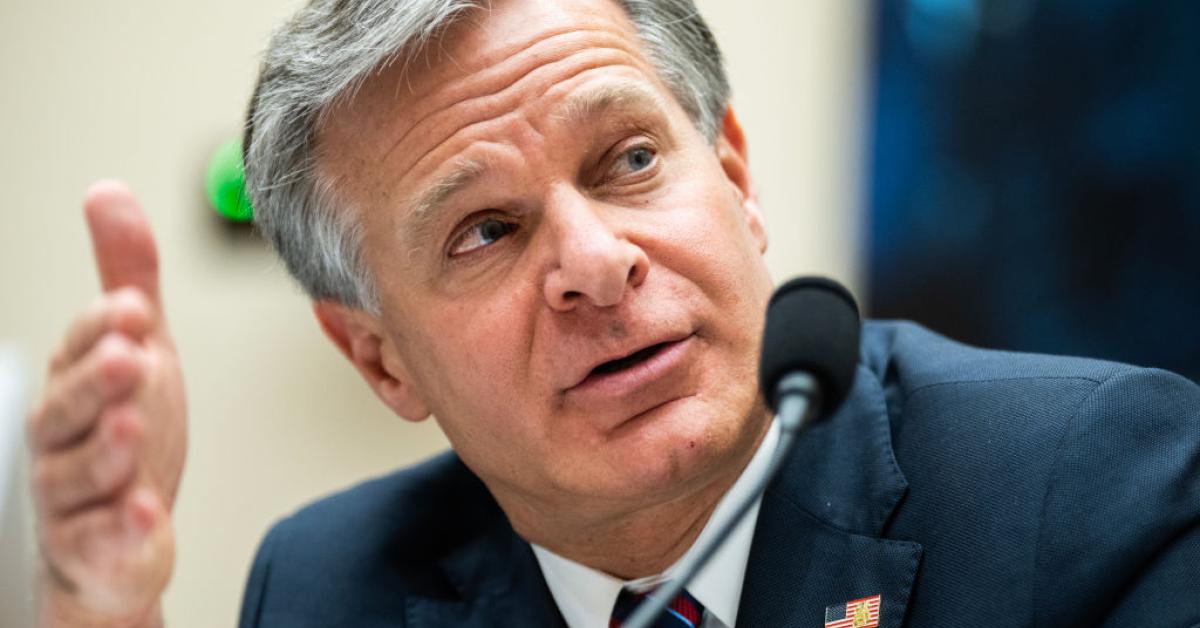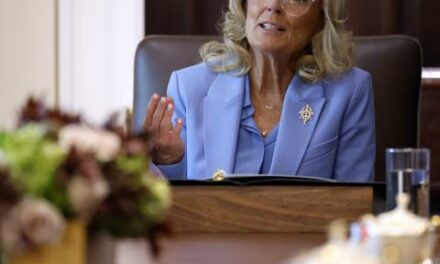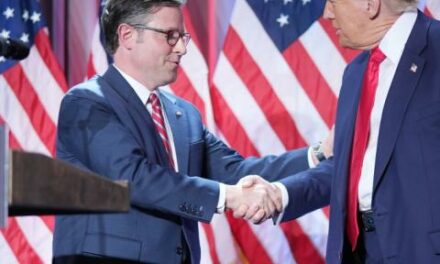We support our Publishers and Content Creators. You can view this story on their website by CLICKING HERE.

The FBI began sounding an alarm last year that events in the Middle East, like ISIS terror attacks after the fall of Afghanistan, could inspire lone wolves in the United States to commit attacks domestically.
The New Year’s terror attack by suspect Shamsud-Din Jabbar, who plowed into a crowd on Bourbon Street in the well-known French Quarter of New Orleans, seems to fit a pattern the director told members of Congress he was worried about.
FBI Director Christopher Wray specifically warned in April in testimony before Congress that there was an increasing danger that individuals in the United States could be radicalized by events in the Middle East to carry out attacks on U.S. soil as homegrown terrorists.
Inspired by ISIS
The FBI said in a press conference Thursday that Jabbar announced his support of ISIS on the social media platform Facebook just hours before killing 14 people and injuring others, confirming the suspect was inspired by the Islamic terror group.
“So what I can tell you right now is that he was 100% inspired by ISIS. And so we’re digging — we’re digging through more of the social media, more interviews, working with some of our other partners to-to ascertain just how to ascertain a little bit more about that connection,” said Christopher Raia, the FBI deputy director for counterterrorism.
The terror attack follows at least one previous ISIS-inspired plot foiled by the FBI that showed the rising dangers of radical Islamic terrorism against the homeland following the collapse of the U.S.-backed government in Afghanistan and after the terror group Hamas attacked Israel on October 7th, 2023, where 1,200 men, women, and children – including 46 Americans and citizens of more than 30 countries – were slaughtered by Hamas.
ISIS Inspiration & FBI Warning
ISIS specifically has increasingly appeared on U.S. and allies’ radars after the fall of the American-backed government in Afghanistan, prompting warnings from the British intelligence chief in October that the terror group has “resumed their efforts to export terrorism,” Just the News previously reported.
ISIS-Khorasan, the groups regional branch in Afghanistan and Pakistan, is described as the “one of ISIS’s most lethal branches” by the Office of the Director of National Intelligence and claimed responsibility for both the Abbey Gate bombing during the U.S. withdrawal from Afghanistan in 2021 and a deadly concert hall attack in Moscow last year.
Earlier this year, Director Wray told Congress that these recent successful attacks by the group and other events in the Middle East could fuel the very kind of homegrown radicalization that reared its head in New Orleans.
“Our most immediate concern has been that individuals or small groups will draw twisted inspiration from the events in the Middle East to carry out attacks here at home,” Wray told the a House Appropriations subcommittee in April.
How was Jabbar radicalized?
Before his Facebook posts, there was little indication that Jabbar had been radicalized and was seeking to commit a mass atrocity, family members and friends have said. Ultimately, the three phones and two laptops linked to Jabbar seized by the FBI are are expected to aid investigators in uncovering more about the suspect’s motive.
Shamsud-Din Jabbar converted to Islam at an early age, according to his brother Abdur Jabbar, who told The New York Times his brother did not show any signs of the radicalization he blames for the attack. “As far as I know he was a Muslim for most of his life,” said Abdur Jabbar. “What he did does not represent Islam. This is more some type of radicalization, not religion.”
He also said his older brother was “a sweetheart really, a nice guy, a friend, really smart, caring,” according to the Times.
What is known of Jabbar’s private life gives little further indication of how he was radicalized into committing a terror attack. Jabbar, an Army veteran, worked mostly in information technology, the U.S. Army said in a statement. He deployed to Afghanistan once and was discharged from the reserve in 2020, according to The New York Times.
Those who knew him before the attack said he exhibited no concerning behavior, and though he appeared to take his Islamic faith seriously, never threatened violence or expressed radical ideas.
But just hours before the New Year’s massacre, Jabbar signaled a radical shift in his outlook. In videos posted to his Facebook page, Jabbar pledged support for ISIS, the FBI said at a Thursday press conference.
The Islamic State’s distinct black flag bearing the words of the Muslim declaration of faith known as the shahada—“There is no god but Allah. Mohammad is the messenger of Allah”—was discovered on the vehicle Jabbar used in the attack.
“This is a complete 180 from the quiet, reserved person I knew,” Chris Pousson, a retired Air Force veteran who grew up with Jabbar in Beaumont, Texas and attended the same middle and high school told the Times.
“He wasn’t a troublemaker at all,” Pousson said. “He made good grades and was always well-dressed in button-ups and polo shirts.”
More zealous
Though Pousson noted that after he reconnected with Jabbar following military service, Jabbar appeared to be more zealous in his faith. “Before, if he was into it, he wasn’t open or verbal about it,” Pousson said of Jabbar’s Muslim faith. But the former classmate said Jabbar began exhibit more “passion” about Islam, though said he saw no extremist content.
“It was never Muslim extremist stuff, and he was never threatening any violence, but you could see that he had gotten really passionate,” Pousson said.
A 2016 study funded by the Department of Justice on homegrown Islamic radicalization found that “new-found religious fervor” is a “common precursor” to that radicalization. This stage is usually followed by seeking out a group of like-minded believers, the study concluded.
Local mosque faces scrutiny
The Wall Street Journal reported that in Beaumont, Texas, Jabbar lived in a community of Muslims near a local mosque called Masjid Bilal affiliated with the Islamic Society of Greater Houston. It is not known whether Jabbar attended the mosque.
After news broke that Jabbar committed the attack, Masjid Bilal put out a statement on Facebook and Instagram condemning the violence and directing members of the congregation to not speak to media and to forward all media requests to the Council for American-Islamic Relations (CAIR). CAIR is labeled a terror group by the United Arab Emirates because of its alleged affiliation with the Muslim Brotherhood.
“If anyone is contacted by the media, it is very important that you do not respond. If approached by the FBI and a response is necessary, please refer to CAIR and ISGH. It is crucial that we stay united at this time as we condemn these terrible acts,” the mosque posted.
In recordings of sermons that surfaced after the attack, the Mosque’s Imams accused Jews of trying to “take control of the economy” and said the West supports Israel because they do not want Jews to return to Europe.
“That is why the other countries don’t want them back. So when they support them, they are not supporting them because they love them. It’s like: ‘Please stay there, we’ll do whatever [it takes], stay there, don’t come back’,” according to a sermon from Imam Eiad Soudan uncovered by MEMRI TV.
Masjid Bilal could not be reached for comment. As of Friday, the mosque’s website appeared to be taken down.
Family troubles, “acting crazy”
Jabbar also had troubles with his family preceding the attack, specifically his ex-wife, with whom he shared two daughters. He divorced his first wife in 2012, according to the New York Times.
Dwayne Marsh, who is now married to Jabbar’s ex-wife, said the suspect began acting “crazy” in recent months related to his conversion to Islam and that he and his wife stopped permitting Jabbar to visit with his two daughters. In the midst of a second divorce in 2022, Jabbar emailed his then-wife’s lawyer describing significant financial problems.
The FBI said Thursday at a press conference that Jabbar made references to plans to kill his family in the pre-attack videos he posted to Facebook, but decided to carry out a more public attack to make clear his radical intent.

 Conservative
Conservative  Search
Search Trending
Trending Current News
Current News 





